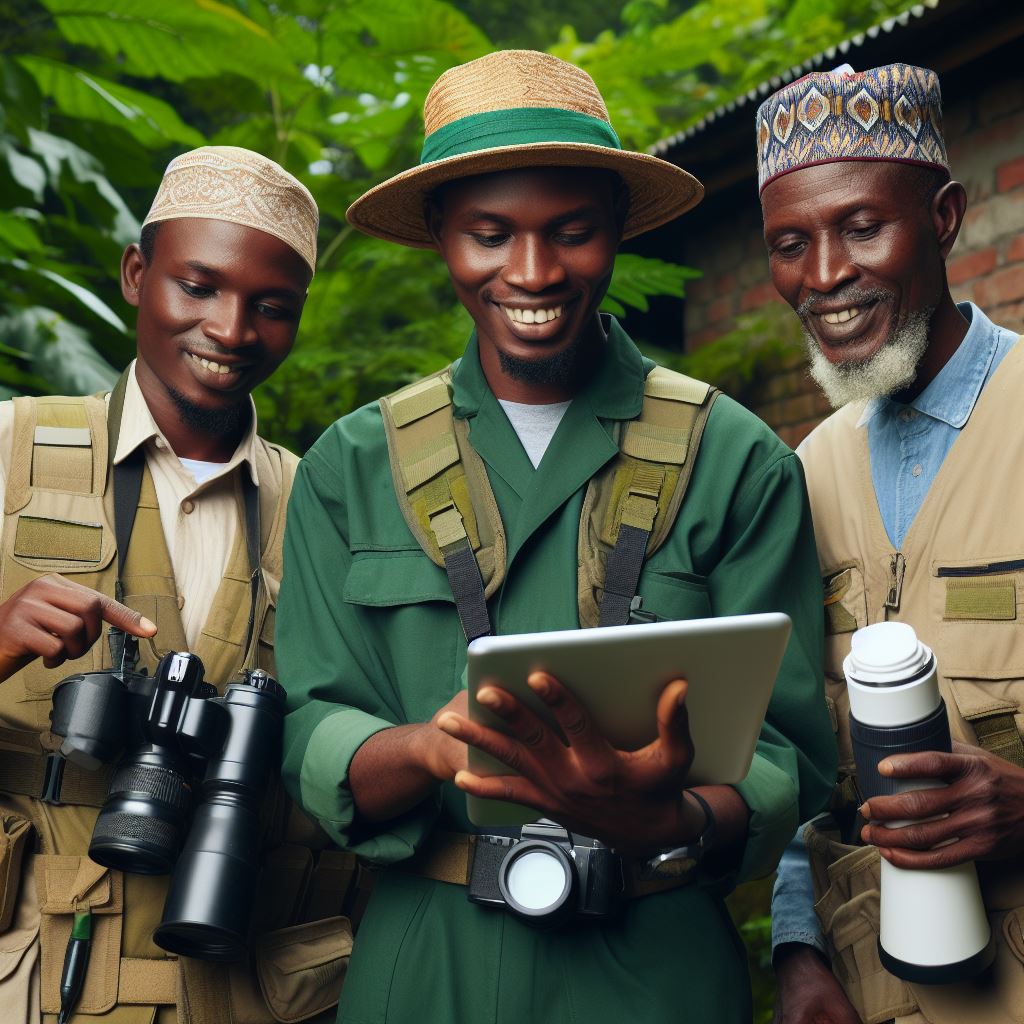Introduction
Fieldwork and practical training are integral components of Nigerian ecotourism courses, providing students with an immersive and experiential learning experience.
These activities allow students to apply theoretical knowledge in real-life settings, enhancing their understanding and skills in ecotourism.
By definition, fieldwork refers to the collection of data and conducting research in the natural environment.
Practical training, on the other hand, involves developing practical skills through hands-on activities, such as conducting surveys, identifying flora and fauna, and observing ecosystems.
The importance of fieldwork and practical training in Nigerian ecotourism courses cannot be understated.
These activities enable students to gain insights into the complex dynamics of ecosystems, understand the impacts of human activities, and learn about sustainable tourism practices.
Moreover, fieldwork and practical training foster experiential learning, allowing students to develop critical thinking, problem-solving, and decision-making skills.
Through fieldwork, students have the opportunity to interact with local communities, understand their cultures and traditions, and promote community-based ecotourism initiatives.
Fieldwork and practical training in Nigerian ecotourism courses encourage students to appreciate the value of conservation and biodiversity, while equipping them with the skills to address environmental challenges and contribute to sustainable development.
This hands-on approach not only enhances students’ knowledge and skills, but also instills a sense of responsibility and stewardship towards the environment.
In essence, fieldwork and practical training play a crucial role in Nigerian ecotourism courses, enabling students to apply theoretical knowledge, develop practical skills, and foster a deeper understanding of ecological dynamics.
These activities empower students to become responsible and knowledgeable ecotourism professionals, equipped to address environmental challenges and promote sustainable tourism practices.
Overview of Nigerian Ecotourism Courses
Ecotourism and its Significance in Nigeria
Ecotourism promotes responsible travel that conserves the environment and supports local communities.
Nigeria, with its rich biodiversity and cultural heritage, has immense potential for ecotourism.
Ecotourism helps in preserving natural resources, protects wildlife, and uplifts the socio-economic status of local communities.
It fosters environmental education, creating awareness among tourists about conservation and sustainable practices.
Ecotourism Courses Offered in Nigerian Institutions
Nigerian universities and institutions offer various courses catering to the growing interest in ecotourism.
Bachelor’s degree programs in ecotourism focus on environmental science, natural resource management, and sustainable tourism.
Some institutions offer graduate programs specialized in ecotourism management, research, and community development.
These courses provide theoretical knowledge and practical training through fieldwork, internships, and case studies.
Students learn about biodiversity conservation, ecotourism planning, sustainable practices, and cultural heritage management.
Fieldwork is an essential component where students gain hands-on experience in various ecosystems and tourism activities.
Students conduct surveys, species identification, environmental impact assessment, and community-based tourism projects.
Practical training enables students to develop skills in ecotourism management, marketing, hospitality, and customer service.
Institutions collaborate with national parks, wildlife reserves, and local communities, offering real-world exposure to students.
Students organize awareness campaigns, nature trails, and community engagement programs to promote sustainable tourism.
Ecotourism courses also incorporate entrepreneurship skills, encouraging students to start their own eco-friendly tourism ventures.
Institutions provide opportunities for students to participate in workshops, seminars, and conferences relevant to ecotourism.
Graduates of these courses have diverse career prospects in ecotourism operations, wildlife conservation, and sustainable development.
They can work as ecotourism managers, park rangers, naturalists, community development officers, or consultants.
Ecotourism courses contribute to the overall growth of the tourism industry, positioning Nigeria as an eco-friendly destination.
Nigerian ecotourism courses play a crucial role in fostering sustainable tourism practices through fieldwork and practical training.
These courses promote conservation, sustainable development, and community empowerment.
They equip students with the necessary knowledge and skills to contribute to the growth of ecotourism in Nigeria while protecting the country’s rich natural and cultural heritage.
Read: Innovations & Breakthroughs from Nigerian Toxicologists
Importance of Fieldwork and Practical Training in Ecotourism Courses
Enhancing practical skills and knowledge
- Fieldwork allows students to apply theoretical knowledge gained in the classroom to real-life situations.
- Practical training provides hands-on experience in the various aspects of ecotourism, such as conservation and sustainability.
- Students learn valuable skills, including data collection, species identification, and environmental impact assessment.
- Fieldwork and practical training enhance problem-solving abilities and critical thinking skills.
- Students gain a deeper understanding of the challenges and complexities involved in managing ecotourism destinations.
- Hands-on learning fosters a sense of independence and self-confidence in students.
- Fieldwork and practical training enable students to develop a holistic approach towards ecotourism management.
Providing real-world experiences
- Fieldwork exposes students to authentic ecotourism environments, allowing them to see concepts in action.
- Practical training immerses students in the everyday operations of ecotourism businesses and organizations.
- Students engage with local communities and witness the socio-cultural impacts of ecotourism firsthand.
- Real-world experiences help students understand the delicate balance between tourism and environmental preservation.
- Students gain exposure to the challenges faced by ecotourism practitioners and learn how to overcome them.
- Fieldwork and practical training enable students to see the positive impacts of sustainable tourism practices.
Building professional networks and connections
- Fieldwork provides opportunities for students to collaborate with industry professionals and experts.
- Practical training allows students to form relationships with potential employers and mentors in the field.
- Networking during fieldwork opens doors for future job opportunities and internships.
- Students can learn from experienced professionals and gain insights into the industry’s best practices.
- Fieldwork and practical training allow students to build a professional reputation and credibility in the industry.
- Connections made during fieldwork can lead to partnerships and collaborative research opportunities.
In short, fieldwork and practical training are essential components of ecotourism courses.
They provide students with valuable hands-on experience, enhance their practical skills and knowledge, expose them to real-world situations, and allow them to build professional networks.
By engaging in fieldwork and practical training, students become better equipped to contribute to the sustainable development of ecotourism destinations in Nigeria and beyond.
Read: Linking Traditional Conservation Methods with Modern Studies
Components of fieldwork and practical training in Nigerian ecotourism courses
Fieldwork is an essential component of ecotourism courses in Nigeria.
Transform Your Career with Expert Guidance
Get personalized mentorship consulting that’s tailored to your unique path. Our expert advice is actionable and exclusive.
Get StartedIt provides students with hands-on experience and practical knowledge in the field of ecotourism.
This chapter explores the different components of fieldwork and practical training in Nigerian ecotourism courses.
Site visits to ecotourism destinations
One of the key components is site visits to ecotourism destinations.
These visits allow students to observe and study ecotourism practices in real-life settings.
By witnessing ecotourism activities firsthand, students gain a deeper understanding of the concepts taught in the classroom.
They can see the implementation of sustainable practices and conservation efforts, which helps them comprehend the importance of these practices in preserving natural resources and protecting the environment.
These site visits also expose students to the challenges and opportunities present in the ecotourism industry.
Hands-on activities and practical exercises
Another component of fieldwork and practical training is hands-on activities and practical exercises.
Students actively engage in ecotourism activities such as nature walks, birdwatching, and wildlife monitoring.
These activities enable students to develop practical skills and enhance their knowledge about flora, fauna, and ecosystems.
By actively participating in research projects related to ecotourism, students acquire research skills and contribute to the advancement of knowledge in the field.
Internships and industry attachments
Internships and industry attachments are also crucial components of fieldwork and practical training.
Students have the opportunity to collaborate with ecotourism organizations and experts, allowing them to learn from professionals currently working in the industry.
This collaboration brings practical experience and exposure to different aspects of ecotourism.
Internships provide students with real-world experience, allowing them to apply their theoretical knowledge in a professional setting.
Working in ecotourism businesses gives them a firsthand understanding of the operations, challenges, and strategies employed in the industry.
The components of fieldwork and practical training in Nigerian ecotourism courses play a vital role in shaping students’ understanding and proficiency in the field.
By combining site visits, hands-on activities, and internships, students gain practical knowledge that complements their theoretical education.
This holistic approach equips them with the skills and experience necessary to pursue a career in the growing field of ecotourism.
Read: Best Nigerian Universities for Ecotourism & Wildlife Studies

Benefits of Fieldwork and Practical Training in Nigerian Ecotourism Courses
Improved Employability Prospects
Fieldwork and practical training are essential components of Nigerian ecotourism courses as they provide students with valuable hands-on experience in the industry.
Engaging in fieldwork allows students to gain practical skills and knowledge that can significantly improve their employability prospects.
By participating in fieldwork, students have the opportunity to work directly in ecotourism sites, interact with clients, and understand the day-to-day operations of the industry.
This practical experience not only enhances their understanding of the field but also allows them to demonstrate their abilities and dedication to potential employers.
Employers often value candidates who have practical experience in addition to theoretical knowledge, as it demonstrates their ability to apply theoretical concepts in real-life situations.
Students who have undergone fieldwork and practical training have a competitive edge in the job market.
Application of Theoretical Knowledge in Real-Life Situations
One of the significant benefits of fieldwork and practical training in Nigerian ecotourism courses is the opportunity for students to apply their theoretical knowledge in real-life situations.
While theoretical concepts provide a foundation, practical experience allows students to understand how these concepts are implemented in the context of ecotourism.
During fieldwork, students can observe and participate in activities such as wildlife conservation, sustainable development, and community engagement.
These experiences help them connect theory to practice, deepen their understanding, and develop critical thinking skills.
They learn to adapt their knowledge to diverse situations and make informed decisions based on real-world challenges.
Applying theoretical knowledge in real-life situations enhances students’ problem-solving abilities.
They learn to think on their feet, analyze situations, and develop effective solutions.
This practical experience not only prepares them for future employment but also equips them with valuable skills applicable to various aspects of their personal and professional lives.
Development of Transferable Skills such as Teamwork, Communication, and Problem-Solving
In addition to improving employability and applying theoretical knowledge, fieldwork and practical training in Nigerian ecotourism courses contribute to the development of transferable skills.
These include teamwork, communication, and problem-solving, which are highly valued in any professional setting.
Working in teams during fieldwork exposes students to collaborative work environments, where they learn to communicate effectively, share responsibilities, and contribute to collective goals.
This experience fosters skills such as leadership, cooperation, and conflict resolution, all of which are vital in professional settings.
Fieldwork requires constant interaction with various stakeholders, including local communities, government agencies, and tourists.
This exposure enhances students’ communication skills, enabling them to effectively convey information, negotiate, and build relationships with diverse individuals.
These skills are essential for success in the ecotourism industry, where communication with different stakeholders is crucial.
They learn to identify problems, evaluate different options, and implement effective solutions.
These problem-solving abilities contribute not only to their success in the ecotourism industry but also to their overall personal growth and adaptability in various situations.
In general, fieldwork and practical training in Nigerian ecotourism courses offer numerous benefits to students.
These experiences improve their employability prospects, allow the application of theoretical knowledge in real-life situations, and facilitate the development of transferable skills.
Students who engage in fieldwork and practical training are better equipped to succeed in the ecotourism industry and beyond.
Read: Lab Work & Equipment in Nigerian Toxicology Departments
Challenges and Solutions in Conducting Fieldwork and Practical Training in Nigerian Ecotourism Courses
Conducting fieldwork and practical training in Nigerian ecotourism courses presents various challenges.
This section will discuss the obstacles encountered in the process and propose possible solutions to overcome them.
Lack of funds and resources
One major challenge faced during fieldwork and practical training is the limited availability of funds and resources.
Ecotourism courses often require financial support for transportation, equipment, and other necessary expenses. However, there are solutions that can alleviate this issue.
One solution is to seek external funding and sponsorships.
Educational institutions offering ecotourism courses can collaborate with governmental agencies, non-profit organizations, or private companies to secure additional financial resources.
These partnerships can provide the necessary funds to cover expenses related to fieldwork and practical training.
Another solution is to utilize local resources and establish partnerships.
By working closely with local communities, students and instructors can minimize costs and access resources within the vicinity.
Local guides, accommodations, and transportation options can be sourced from the community, leading to a more sustainable approach that benefits both the course participants and the local economy.
Limited access to ecotourism sites
Another challenge faced when conducting fieldwork and practical training in Nigerian ecotourism courses is the limited access to specific ecotourism sites.
Many natural reserves and protected areas have restricted entry due to conservation efforts.
However, this obstacle can be overcome through collaboration and alternative approaches.
One solution is to collaborate with local communities and authorities.
Engaging with the communities residing near the ecotourism sites and seeking their support can lead to permissions being granted.
By involving the local communities in the educational process, ecotourism courses can foster a sense of ownership and responsibility towards the conservation of these sites.
Exploring alternative sites or approaches can help overcome limited access.
Nigeria is rich in biodiversity, offering numerous ecotourism sites.
In instances where access to specific sites is restricted, instructors can identify alternative sites that provide similar learning opportunities.
This approach ensures that students still gain practical experience while respecting the conservation measures in place.
In review, conducting fieldwork and practical training in Nigerian ecotourism courses may face challenges such as lack of funds and limited access to ecotourism sites.
However, by seeking external funding, utilizing local resources, collaborating with communities, and exploring alternative approaches, these challenges can be overcome.
It is essential to adapt and find innovative solutions to ensure the success of ecotourism education in Nigeria.
Explore Further: Sustainable Horticulture in Nigeria
Success stories and examples of fieldwork and practical training in Nigerian ecotourism courses
Fieldwork and practical training play a crucial role in Nigerian ecotourism courses, shaping students’ experiences and achievements.
Through case studies and interviews with professionals and instructors, we can gain insights into the success stories that emerge from such immersive learning opportunities.
Case studies of students’ experiences and achievements
One notable success story is that of John, a student who participated in an ecotourism course.
During his fieldwork in a Nigerian rainforest, he meticulously documented a wide range of bird species and plant specimens.
John’s valuable contribution to environmental research highlighted the significance of fieldwork in gathering critical data for conservation efforts.
Besides data collection, practical training exposed John to various aspects of ecotourism management.
He developed skills in biodiversity assessment and gained insights into sustainable practices.
His successful fieldwork experience not only enhanced his knowledge but also opened doors for future employment opportunities.
John received a job offer as a nature guide in a local ecotourism company, showcasing how fieldwork can directly lead to rewarding career prospects.
John’s story is just one example of how fieldwork and practical training offer students hands-on experiences that prepare them for the real world.
These immersive opportunities enable students to apply theoretical knowledge in practical and relevant contexts, fostering their growth and skill development.
Interviews with ecotourism professionals and instructors
Interviews with industry professionals further underline the significance of fieldwork and practical training in Nigerian ecotourism courses.
Maria, an experienced ecotourism professional, emphasized the transformative impact of these experiences.
According to her, fieldwork provides students with a deeper understanding of the challenges and potentials of ecotourism.
By engaging with natural environments firsthand, students develop a heightened appreciation for conservation and sustainable practices.
Maria shared inspiring examples of students who conducted fieldwork in Nigerian national parks and subsequently designed their own conservation projects.
These initiatives demonstrated the practical applicability of the skills acquired through fieldwork, as well as students’ dedication to making positive contributions to the environment.
Interviews with instructors highlighted the benefits of practical training.
One instructor discussed organizing community-based ecotourism initiatives, where students could interact with local communities and directly contribute to sustainable tourism practices.
Such practical experiences equipped students with essential skills, while also instilling a sense of responsibility towards the environment and host communities.
The interviews with ecotourism professionals and instructors confirm the pivotal role of fieldwork and practical training in Nigerian ecotourism courses.
They serve as catalysts for students’ personal and professional growth, ensuring their preparedness for successful careers in the ever-evolving ecotourism industry.
Delve into the Subject: Sustainable Livestock Farming Practices in Nigeria
Conclusion
Fieldwork and practical training play a crucial role in Nigerian ecotourism courses.
They provide students with hands-on experience, enabling them to develop essential skills and knowledge in a real-world setting.
Through fieldwork, students gain an in-depth understanding of the diverse ecosystems, wildlife, and cultural heritage found in Nigeria.
Practical training allows students to apply theoretical concepts learned in the classroom, enhancing their problem-solving and critical thinking abilities.
This hands-on approach fosters a deep appreciation for the environmental and socio-cultural aspects of ecotourism.
The importance of fieldwork and practical training cannot be overstated.
They prepare students for future careers in the ecotourism industry, equipping them with practical skills and competencies sought after by employers.
By actively engaging with the environment, students develop a strong sense of responsibility towards sustainable tourism practices.
For prospective students considering ecotourism programs, it is crucial to choose courses that offer significant practical components.
These programs provide invaluable opportunities for immersive learning, enabling students to acquire real-world experience.
By actively participating in fieldwork and practical training, students can develop a deeper understanding of ecotourism principles and practices.
Fieldwork and practical training are not just add-ons but integral components of Nigerian ecotourism courses.
They offer extensive benefits and play a vital role in shaping the next generation of ecotourism professionals committed to sustainability and conservation.




